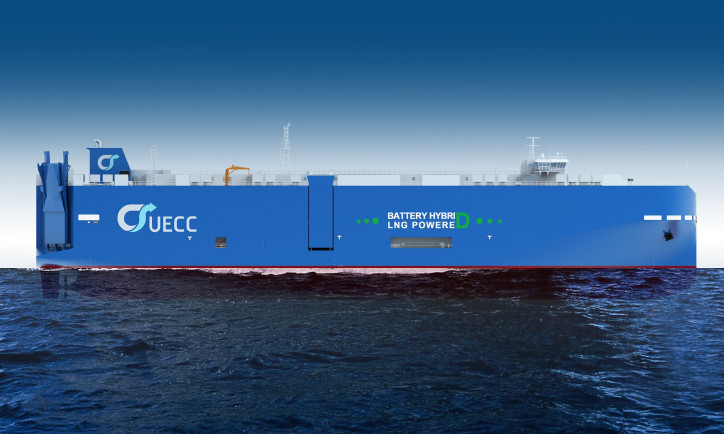Close on the heels of their call for two new battery hybrid LNG PCTCs, UECC has confirmed an option with China Ship Building Trading Co., Ltd and Jiangnan Shipyard Group Co. Ltd. for a third battery hybrid LNG vessel, this time slated for UECC’s Atlantic short sea trade.

“This order is another step in our commitment to cleaner shipping,” says Glenn Edvardsen, CEO of UECC. “Our experience with LNG duel-fuel vessels has been good, and we want to keep moving forward to expand our sustainable fleet.”
Already winners, UECC’s two first ECO-class vessels grabbed first and second place in Bremenports’ Greenports Award 2018 for being cleanest ships calling at one of Europe's busiest ports. With the addition of battery hybrid technology, the three new ships raise the environmental protection bar even further.
Taking smart new steps
The new orders will push the UECC duel-fuel LNG fleet to five vessels. “When our third battery hybrid LNG PCTC is delivered in 2022, it ushers in a new era for UECC and short sea shipping in Europe,” says Edvardsen. “That will give us a total of five eco-friendly vessels in our fleet. This represents more than 50% of the UECC owned fleet, and no other short sea company, or deep sea for that matter, can demonstrate such a sustainable fleet.”
Edvardsen acknowledges the importance of experience in the decision to invest in battery hybrid LNG. “A ship is a significant and long-term investment. We wanted to expand the use of new technologies to meet or exceed future sustainability requirements, and we feel our choice with the first two LNG vessels has been justified over nearly three years of operation. This experience gives us the confidence to move forward with even more eco-friendly technologies.”
The new battery-hybrid solution will take UECC beyond the IMO target of 40% reduction in carbon intensity by 2030. The three vessels will also meet the IMO Tier 3 NOx emissions limitations entering into force in the Baltic and North Sea from 2021 keel lays.
Electric power saves fuel, reduces emissions
“Batteries are a key step toward next generation sustainability,” Edvardsen observes. Battery power on the new vessels will improve operational efficiency and further reduce emissions through peak shaving, in addition to handling partial accommodation load and driving auxiliary equipment. “It also provides an option for reducing emissions while in port, and that is becoming more important for many cities,” he notes.
“UECC’s parent companies, NYK and Wallenius Lines, have sustainability in their DNA,” Glenn Edvardsen concludes. “It is an honor to be able to take UECC to the next level of clean shipping with their support.”
Source: UECC